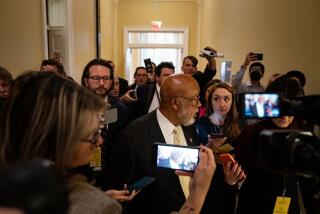Alyeska Bid to Ax Whistle-Blowing May Have Been Illegal, Report Says
- Share via
A draft congressional committee report concludes that the operator of the trans-Alaska oil pipeline may have broken federal and state laws when it ordered a 1990 covert sting operation aimed at silencing environmental whistle-blowers and gathering damaging information on Rep. George Miller (D-Martinez).
The draft report, prepared for the House Committee on Interior and Insular Affairs and released Thursday, recommends that the U.S. Justice Department and several states consider bringing charges against the Alyeska Pipeline Service Co. and its security contractor, Wackenhut Corp.
“I find Alyeska’s and Wackenhut’s conduct in this case completely unacceptable,” said Miller, who chairs the committee and has been a vocal critic of Alyeska in the past.
In Anchorage, Robert Jordan, a lawyer representing Alyeska, denied that any laws were broken. The draft report “is a continuation of an effort to discredit Alyeska . . . based on a lot of unsupported allegations,” he said. “If (committee members) took a look at the supporting documents, they’d be shocked and dismayed at the distortions or exaggerations and the conclusions reached without any support,” he added.
A spokesman at Wackenhut’s headquarters in Coral Gables, Fla., declined to comment.
The draft report, prepared by Miller’s staff, is based on an investigation of thousands of pages of documents and three days of testimony in Washington last November.
The report, which will be submitted for committee approval Wednesday, charges that Alyeska ordered the probe to thwart efforts by critics to feed information on environmental misdeeds to the committee. Such obstruction would be illegal.
At the time of the sting, Miller’s committee was looking into the 1989 oil spill from the Exxon Valdez and was also scrutinizing Alyeska’s operations.
The main focus of the sting was environmental gadfly Charles Hamel, a retired Virginia oil tanker broker and longtime Alyeska critic.
The report said Wackenhut agents posed as environmental lawyers and obtained private telephone records, credit and financial reports; secretly recorded telephone conversations, and removed documents from Hamel’s home. Those activities may have violated federal or state laws, the report said.
“Alyeska and its Wackenhut agents sought to create an environment which they believed would stop the flow of damaging information from Alyeska’s employees through Hamel to state and federal authorities, including this committee, and compromise those authorities’ ability to use any information obtained through Hamel,” the report said.
The report rejected arguments by Alyeska that the probe was conducted to identify the source of stolen proprietary documents.
More to Read
Sign up for Essential California
The most important California stories and recommendations in your inbox every morning.
You may occasionally receive promotional content from the Los Angeles Times.













